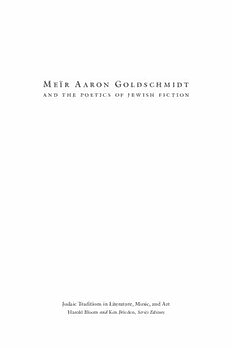
Meir Aaron Goldschmidt and the Poetics of Jewish Fiction PDF
Preview Meir Aaron Goldschmidt and the Poetics of Jewish Fiction
M e ï r A a r on G ol d s c h m i d t and the Poetics of Jew ish f iction Judaic Traditions in Literature, Music, and Art Harold Bloom and Ken Frieden, Series Editors Select titles from Judaic Traditions in Literature, Music, and Art Bridging the Divide: The Selected Poems of Hava Pinhas-Cohen Sharon Hart-Green, ed. and trans. Lingering Bilingualism: Modern Hebrew and Yiddish Literatures in Contact Naomi Brenner Literary Hasidism: The Life and Works of Michael Levi Rodkinson Jonatan Meir; Jeffrey G. Amshalem, trans. My Blue Piano Else Lasker-Schüler; Brooks Haxton, trans. Social Concern and Left Politics in Jewish American Art: 1880–1940 Matthew Baigell Travels in Translation: Sea Tales at the Source of Jewish Fiction Ken Frieden The Travels of Benjamin Zuskin Ala Zuskin Perelman Vilna My Vilna: Stories by Abraham Karpinowitz Helen Mintz, trans. Meïr Aaron Goldschmidt and the Poetics of Jewish Fiction . . . dav i d G a n t t G u r l e y Syracuse University Press Copyright © 2016 by Syracuse University Press Syracuse, New York 13244-5290 All Rights Reserved First Edition 2016 16 17 18 19 20 21 6 5 4 3 2 1 ∞ The paper used in this publication meets the minimum requirements of the American National Standard for Information Sciences—Permanence of Paper for Printed Library Materials, ANSI Z39.48-1992. For a listing of books published and distributed by Syracuse University Press, visit www.SyracuseUniversityPress.syr.edu. ISBN: 978-0-8156-3486-7 (hardcover) 978-0-8156-3472-0 (paperback) 978-0-8156-5384-4 (e-book) Library of Congress Cataloging-in-Publication Data Available from publisher upon request. Manufactured in the United States of America This book is dedicated to all the Fontenots, but especially my mother, Janice Marie. Without her undying love and unwavering support for my education, none of this would have been possible: you taught me my first words and how to love language. Contents Acknowledgments ix Prologue: “In the Spirit of ‘Num” 1 1. “I Am of the Tribe of Levi” 27 2. Midrash and Metaphor 60 3. The World of Allusion 103 4. The Figure of the Rabbi 138 Epilogue: The Wandering Jew as Possibility 169 Notes 177 Bibliography 223 Index 241 Acknowledgments M any people over the course of my education and life have con- tributed to this work in various ways. My days at Bard College were seminal in my formation as a writer and thinker, and I would like to begin by thanking Richard C. Wiles. Dick, as I called him, was an amazing and gifted teacher yet treated me like a colleague. More than any other he was the scholar who introduced me to the life of the mind, and I will always be grateful for the many penetrative and engaging discussions I had under his tutelage. In the acknowledg- ments to my BA thesis, I wrote how everything I would write after Bard would always bear his name, so I am more than proud to men- tion him here; I am beholden. While at the University of California at Berkeley, I was fortunate to work with many outstanding scholars in Near Eastern Studies and Scandinavian. I would like to thank my dissertation advisor, Karin Sanders, who saw early iterations of this work and offered many productive thoughts on Meïr Goldschmidt and Golden Age Denmark. I am especially indebted to Joseph Dug- gan and Carol Clover. I became more invested in Goldschmidt while I was at Brandes Skolen in Copenhagen under the direction of Pil Dahlerup. Pil’s thoughts and insights were invaluable to my prog- ress as a scholar of Danish, and she brilliantly encouraged me to look deeper into Goldschmidt’s English stories. I spent many hours in the manuscript collection of the Royal Library in Copenhagen thanks to the generosity of Ivan Boserup. Over the years I have had many great discussions with Poul Behrendt and Mads Bunch concerning Goldschmidt, and I am grateful for their enthusiasm and expertise. My time at the Center for Jewish Studies at Harvard allowed me to ix x acknowledGments refocus and refine my thinking on Goldschmidt in a very produc- tive environment. I would like to thank Bernard Septimus and Shaye Cohen for all their early support in this endeavor. I would also like to thank my colleagues in the Department of German and Scandina- vian at the University of Oregon, especially Michael Stern, who has from the beginning believed in this project, and Jeffrey Librett, who advised me during the manuscript’s publication. My good friend Mar- tin Klebes was also instrumental in his support and always unstint- ing with his time. My colleagues in Judaic Studies—Deborah Green, David Wacks, Judith Baskin, and Daniel Falk—also offered many valuable perspectives during the book’s composition. I would like to thank my longtime friend and collaborator Edan Dekel, whose spirit of ethics and whose love of poetry have guided me past many a wind- mill. I would also thank all the students who have sat in my Scandina- vian and Jewish literature classes over the years and who, after being assigned to do so, diligently read and discussed Goldschmidt with me. Many thanks to the Oregon Humanities Center for their generous support. Last but not least, I am also incredibly grateful for my family, friends, and community. My mother and sister have been such special influences in my life, and I owe them much more than could ever be said. I will show this book to my grandfather, Pervis Fontenot, and I suspect that his pride will mean the most of all. It has been a great pleasure sharing Goldschmidt with you all.
